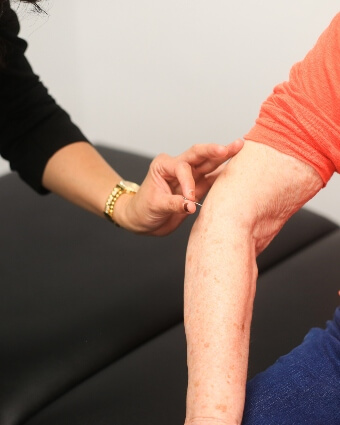Acupuncture in Cambridge
 Acupuncture is the stimulation of specific acupoints along the skin of the body involving various methods such as penetration by thin needles and/or application of heat, pressure or electrical stimulation.
Acupuncture is the stimulation of specific acupoints along the skin of the body involving various methods such as penetration by thin needles and/or application of heat, pressure or electrical stimulation.
It also stimulates the nervous system to release chemicals in the muscles, spinal cord, and brain. These chemicals will either change the experience of pain, or they will trigger the release of the other chemicals and hormones which influence the body’s own internal regulating system.
NEW CLIENTS
What Are The Needles Like? How Does It Feel?
Acupuncture needles are typically made of stainless steel, making them flexible and preventing them from rusting or breaking. Needles are disposable, and they are thrown away after use to prevent contamination.
People experience acupuncture needling differently. Most patients feel only minimal pain as the needles are inserted; some feel no pain at all. Once the needles are in place, there is no pain felt. A dull, heavy or aching feeling often occurs when the needle is placed correctly which is referred to as “de Qi”.
Are There Any Side Effects Of Acupuncture?
As energy is redirected in the body, internal chemicals and hormones are stimulated and healing begins to take place. Occasionally, the original symptoms worsen for a few days, or other general changes in appetite, sleep, bowel or urination patterns, or emotional state may be triggered. These should not cause concern, as they are simply indications that the acupuncture is starting to work.
It is quite common with the first one or two treatments to have a sensation of deep relaxation or even mild disorientation immediately following the treatment. These pass within a short time, and never require anything more than a bit of rest to overcome.
Benefits Of Acupuncture
Acupuncture is used to encourage natural healing, improve mood and energy, to treat a range of conditions; it is also used for pain relief. It is effective and is often successfully used as an alternative to medications or even surgery.
Acupuncture is being studied for its efficacy in alleviating many kinds of pain. Back pain is the most reported use, followed by joint pain, neck pain, and headaches.
The World Health Organization recognizes the use of Acupuncture in the treatment of wide range of problems, including:
- Muscular and Neurological disorders: Headaches, facial tics, neck pain, rib neuritis, frozen shoulder, tennis elbow, various forms of tendonitis, low back pain, sciatica, osteoarthritis.
- Digestive disorders: Gastritis, hyper acidity, spastic colon, constipation, diarrhea.
- Respiratory disorders: Sinusitis, sore throat, bronchitis, asthma, recurrent chest infections. Urinary, menstrual and reproductive problems.
We take pride in the extensive knowledge we have about treating many conditions, and we continue to increase our knowledge through education and practice. We strive to give you the most effective acupuncture treatment for your condition. There are so many pains relief options available at the clinics that are readily available to help get you back to a more functional lifestyle.
Dry-Needling:
A procedure where an acupuncture needle is inserted into the skin and muscle. It can restore muscle activation and strength, restore range of motion, and can produce back pain relief.
Electro-Acupuncture:
A modern variation of acupuncture. It uses electricity to enhance the benefits of this traditional therapeutic treatment.
Schedule Your Appointment
Discover the benefits of acupuncture for natural healing and improved mood. Call Helios Physiotherapy and Rehab today!
CONTACT US

